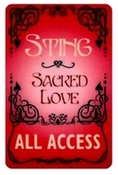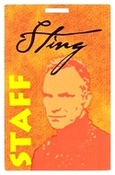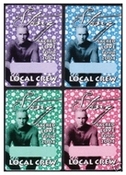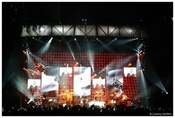
Sacred Love
Feb
27
2004
Chicago, IL, US
Rosemont Theatrewith Chris Botti
Sting's solo act is not so compelling in concert...
Halfway through his show, Sting launched into the Police classic 'Roxanne'. Dominic Miller did a great job emulating Andy Summers' slicing guitar riffs, but it was Sting himself who made the song less than it was. Slowed down and elongated with superfluous filler that detracted from the song's potency, 'Roxanne' became less rock than melodramatic rock opera.
At his sold-out concert Friday night at the Rosemont Theatre, there was no doubt that the dapper Englishman had his heart in the right place. And while no one would fault him for moving away from the cutting-edge music that earned him his initial fame, there also is no doubt that progress doesn't always result in something better.
There's nothing inherently wrong with the songs on his latest album, 'Sacred Love', but there's nothing particularly compelling about them, either. On CD, they sound fine, especially as pleasant background music as you go about your business. But live, the mellow, quasi-jazz numbers don't make you feel alive the way truly great songs do, regardless of their genre.
At his best, Sting can be riveting, as he proved on many of his previous tours. The promise of a great show was there when he opened the concert with 'Walking on the Moon'. Clad in natty black attire, he deftly worked his stand-up bass and showcased his distinct evocative voice. His seven-piece backup band, which included two singers, was well-rehearsed and didn't miss a beat.
But then the videos began. We saw images of ethnic dancers from Korea and Thailand. There were images of topless wood nymphs with Hula-Hoops as a backdrop throughout 'Dead Man's Rope'. And then the words like ''violate'' flashed on the oversized screen.
We get it. You're clever and worldly. But sometimes, all we want is the music.
Personally, I don't care that his music is used in commercials. So was the Beatles' 'Revolution'. The only difference is that Sting capitalized on his own success, while Michael Jackson took full advantage of the Beatles' ripe catalog. Any way you look at it, 'Desert Rose' (better known as ''that Jaguar song'') is mesmerizing and memorable.
But the same can't be said for blase duets like 'Whenever I Say Your Name', which inexplicably won him and Mary J. Blige a Grammy recently. The song is destined to become a standard on ''American Idol.'' Take that how you will.
At this point, forget about Sting's solo relevance. In the big picture, it doesn't matter. He will always be remembered for his work with the Police, and that in itself is a legacy worth remembering.
(c) Chicago Sun-Times by Jae-Ha Kim
Sting coasts through lite jazz show...
Concerts by aging rock talents usually come in two flavors: greatest-hits nostalgia packages and those rarer events when the artist attempts to prove they have something new to say.
Friday night at Rosemont Theatre, Sting chose the latter, more challenging path. Backed by a seven-piece band and three giant graphics-display panels, the singer performed nine songs from his recent 'Sacred Love' album. But instead of mixing the newer material in with stronger classics, he spent the first half of a two-hour show focusing on well-played but underwhelming lite-jazz-infused pop that failed to catch fire or convey the energy of his earlier work.
After opening with an abbreviated 'Walking on the Moon', Sting rushed into several selections before amicably greeting the capacity crowd. Unfortunately, the music didn't benefit from the same sense of urgency. 'Forget About the Future' coasted on an undistinguished elevator-music vibe, and ''Inside'' found the singer spouting rhyming couplets that he seemed to be reading off of a waist-high monitor next to his microphone stand.
Aside from a blistering rendition of The Police's 'Synchronicity II', the only sizzle came not from Sting but background vocalist Joy Rose. During the duet 'Whenever I Say Your Name', Rose dropped to her knees and belted out the evening's most fiery soul, as Sting walked around her with his bass in hand, a casual observer rather than an active participant.
But as Sting waded deeper into the set - and reached farther back into his solo catalog - tempos increased, notes soared and the audience rose to its feet and clapped along. Able to stretch its collective legs, the septet (anchored by drummer Keith Carlock) built a jumpy rhythmic fire under 'Englishman In New York' and propelled the world-beat fusion of 'A Thousand Years' into adventurous waters. The acoustic 'Fields of Gold' floated on beautiful melodies and claimed an emotional vulnerability that the tunes from 'Sacred Love' lacked.
While fans were appreciative of Sting's solo material - particularly the older hits - they were crazy about the few Police numbers he played. With age having shaved just a little off the top of his vocal range and both Stewart Copeland and Andy Summers available, Sting's next career move should be an obvious one.
(c) Chicago Tribune by Bob Gendron
Halfway through his show, Sting launched into the Police classic 'Roxanne'. Dominic Miller did a great job emulating Andy Summers' slicing guitar riffs, but it was Sting himself who made the song less than it was. Slowed down and elongated with superfluous filler that detracted from the song's potency, 'Roxanne' became less rock than melodramatic rock opera.
At his sold-out concert Friday night at the Rosemont Theatre, there was no doubt that the dapper Englishman had his heart in the right place. And while no one would fault him for moving away from the cutting-edge music that earned him his initial fame, there also is no doubt that progress doesn't always result in something better.
There's nothing inherently wrong with the songs on his latest album, 'Sacred Love', but there's nothing particularly compelling about them, either. On CD, they sound fine, especially as pleasant background music as you go about your business. But live, the mellow, quasi-jazz numbers don't make you feel alive the way truly great songs do, regardless of their genre.
At his best, Sting can be riveting, as he proved on many of his previous tours. The promise of a great show was there when he opened the concert with 'Walking on the Moon'. Clad in natty black attire, he deftly worked his stand-up bass and showcased his distinct evocative voice. His seven-piece backup band, which included two singers, was well-rehearsed and didn't miss a beat.
But then the videos began. We saw images of ethnic dancers from Korea and Thailand. There were images of topless wood nymphs with Hula-Hoops as a backdrop throughout 'Dead Man's Rope'. And then the words like ''violate'' flashed on the oversized screen.
We get it. You're clever and worldly. But sometimes, all we want is the music.
Personally, I don't care that his music is used in commercials. So was the Beatles' 'Revolution'. The only difference is that Sting capitalized on his own success, while Michael Jackson took full advantage of the Beatles' ripe catalog. Any way you look at it, 'Desert Rose' (better known as ''that Jaguar song'') is mesmerizing and memorable.
But the same can't be said for blase duets like 'Whenever I Say Your Name', which inexplicably won him and Mary J. Blige a Grammy recently. The song is destined to become a standard on ''American Idol.'' Take that how you will.
At this point, forget about Sting's solo relevance. In the big picture, it doesn't matter. He will always be remembered for his work with the Police, and that in itself is a legacy worth remembering.
(c) Chicago Sun-Times by Jae-Ha Kim
Sting coasts through lite jazz show...
Concerts by aging rock talents usually come in two flavors: greatest-hits nostalgia packages and those rarer events when the artist attempts to prove they have something new to say.
Friday night at Rosemont Theatre, Sting chose the latter, more challenging path. Backed by a seven-piece band and three giant graphics-display panels, the singer performed nine songs from his recent 'Sacred Love' album. But instead of mixing the newer material in with stronger classics, he spent the first half of a two-hour show focusing on well-played but underwhelming lite-jazz-infused pop that failed to catch fire or convey the energy of his earlier work.
After opening with an abbreviated 'Walking on the Moon', Sting rushed into several selections before amicably greeting the capacity crowd. Unfortunately, the music didn't benefit from the same sense of urgency. 'Forget About the Future' coasted on an undistinguished elevator-music vibe, and ''Inside'' found the singer spouting rhyming couplets that he seemed to be reading off of a waist-high monitor next to his microphone stand.
Aside from a blistering rendition of The Police's 'Synchronicity II', the only sizzle came not from Sting but background vocalist Joy Rose. During the duet 'Whenever I Say Your Name', Rose dropped to her knees and belted out the evening's most fiery soul, as Sting walked around her with his bass in hand, a casual observer rather than an active participant.
But as Sting waded deeper into the set - and reached farther back into his solo catalog - tempos increased, notes soared and the audience rose to its feet and clapped along. Able to stretch its collective legs, the septet (anchored by drummer Keith Carlock) built a jumpy rhythmic fire under 'Englishman In New York' and propelled the world-beat fusion of 'A Thousand Years' into adventurous waters. The acoustic 'Fields of Gold' floated on beautiful melodies and claimed an emotional vulnerability that the tunes from 'Sacred Love' lacked.
While fans were appreciative of Sting's solo material - particularly the older hits - they were crazy about the few Police numbers he played. With age having shaved just a little off the top of his vocal range and both Stewart Copeland and Andy Summers available, Sting's next career move should be an obvious one.
(c) Chicago Tribune by Bob Gendron
February 27, 2004
SET LIST
- Walking On The Moon
- Send Your Love
- Inside
- Forget About The Future
- Dead Man's Rope
- Synchronicity II
- Whenever I Say Your Name
- I Was Brought To My Senses
- This War
- Fragile
- Fields Of Gold
- Stolen Car (Take Me Dancing)
- Sacred Love
- Englishman In New York
- Roxanne
- Never Coming Home
- Desert Rose
- If I Ever Lose My Faith In You
- Every Breath You Take
- A Thousand Years









